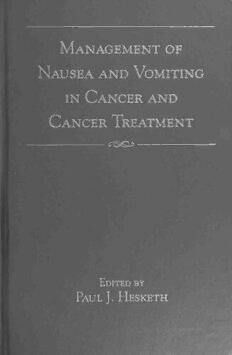
Management of Nausea and Vomiting in Cancer and Cancer Treatment PDF
Preview Management of Nausea and Vomiting in Cancer and Cancer Treatment
Management of Nausea and Vomiting Cancer and in Cancer Treatment Digitized by the Internet Archive 2016 in https://archive.org/details/managementofnausOOpjhe Management of and Vomiting Nausea and Cancer in Cancer Treatment Edited by Hesketh Paul]. — World Headquarters Jones and Bartlett Publishers Jones and Bartlett Publishers Jones and Bartlett Publishers 40 Tall Pine Drive Canada International Sudbury, MA 01776 2406 Nikanna Road Barb House, Barb Mews 978-443-5000 Mississauga, ON L5C 2W6 London W6 7PA CANADA UK [email protected] www.jbpub.com © Copyright 2005 by Jones and Bartlett Publishers, Inc. All rights reserved. No part ofthe material protected by this copyright may be reproduced or utilized in any form, electronic or mechanical, including photocopying, recording, or by any information storage and retrieval system, without written permission from the copyright owner. Library of Congress Cataloging-in-Publication Data Management ofnausea and vomiting in cancer and cancer treatment [edited by] Paul Hesketh. / J. 1st ed. cm. p. ; Includes bibliographical references and index. ISBN 0-7637-3139-0 (hardcover) — — — 1. Nausea. 2. Vomiting. 3. Cancer Complications. 4- Cancer Treatment Complications. 5. Antiemetics. — — & Ag[eDnNtLsM—:a1d.veVrosmeietfifencgts. 4p-reNvaeunstieoan—prceovnetrnotli.on2.&Ancotnitermoelt.i5c.sNetohpelraaspemust—iccuosmep.l3i.caAtinotnisn.eopWlIast1i4c6 M266 2005] I. Hesketh, Paul J., 1952- RB150.N38M365 2005 — 616.99'4061 dc22 2004012083 The authors, editor, and publisher have made every effort to provide accurate information. However, they are not re- sponsible for errors, omissions, orfor any outcomes related to the use ofthe contents ofthis book and take no respon- sibility for the use ofthe products described. Treatments and side effects described in this book may not be applic- able to all patients; likewise, some patients may require a dose orexperience a side effect that is not described herein. The reader should conferwith his orherown physician regarding specific treatments and side effects. Drugs and medical devices are discussed that may have limited availability controlled by the Food and Drug Administration (FDA) for use only in a research study orclinical trial. The drug information presentedhas been derived from refer- ence sources, recently published data, and pharmaceutical researchdata. Research, clinical practice, and government regulations oftenchange the accepted standard in this field. Whenconsideration is being given to use ofany drug in the clinical setting, the healthcare provider orreader is responsible for determining FDA status ofthe drug, read- ing the package insert, reviewing prescribing information for the most up-to-date recommendations on dose, precau- tions, and contraindications, and determining the appropriate usage for the product. This is especially important in the case ofdrugs that are new or seldom used. Production Credits ChiefExecutive Officer: Clayton Jones ChiefOperating Officer: Don W. Jones, Jr. President, Higher Education and Professional Publishing: Robert W. Holland, Jr. V.P., Design and Production: Anne Spencer V.P., Manufacturing and Inventory Control: Therese Brauer V.P., Sales and Marketing: William Kane Executive Publisher: Christopher Davis Amy Production Manager: Rose Associate Production Editor: Jenny L. Mclsaac Editorial Assistant: Kathy Richardson Marketing Manager: Matthew Payne Text Design: Anne Spencer Cover Design: Kristin E. Ohlin Composition: International Typesetting and Composition Printing and Binding: Malloy Inc. Cover Printing: Malloy Inc. Printed in the United States ofAmerica 08 07 06 05 04 10 9 8 7 6 5 4 3 2 1 DEDICATION To my mother Margaret my wife Ann Marie and my children Matthew , , and Meghan for their unfailing support, love, and inspiration. CONTENTS Preface xi Contributors xiii Acknowledgments xv Management of Nausea and Vomiting in CancerTreatment: Introduction, Scope ofthe Problem 1 Introduction 1 Emetic Syndromes 3 Acute Emesis 3 Delayed Emesis 4 Anticipatory Emesis 4 Unique Aspects ofNausea 4 Predictive Factors 5 Magnitude of the Current Problem CINV with 5 Remaining Challenges 7 Summary 9 References 9 Mechanisms ofAcute, Delayed,and Anticipatory Emesis Induced by AnticancerTherapies 15 Introduction 15 Cave to Clinic: Nausea and Vomiting in an Evolutionary Context 16 VI Contents Overview of the Neurophysiology of Nausea and Vomiting 18 Pathways for the Induction ofNausea and Vomiting 18 . . Motor Outputs 21 Nausea 23 Integration of Inputs and Coordination of Outputs ... 26 Mechanisms of Acute and Delayed Nausea and Vomiting Induced by Anticancer Therapies 27 Acute Nausea and Vomiting Induced by Anticancer Therapies 29 Pharmacology of Antiemetics in the Acute Phase 36 5-HT^ Receptor Antagonist “Failures” 36 Actions of Dexamethasone 38 Delayed Nausea and Vomiting Induced by Anticancer Therapies 38 Terminology 39 Acute and Delayed Relationship 39 Pathways and Mechanisms of Delayed Emesis 40 Patient Factors 41 Is 5-HT Involved in Delayed Emesis and Are There Any Lessons To Be Learned from Neurochemical Studies During Acute Emesis? 42 Role of Substance P 43 ACTH Glucocorticoids and Mimetics 44 Other Neurotransmitter Pathways 46 Peripheral Nerve Lesions Antagonize But Fail to Prevent Delayed Emesis 47 Anticipatory Nausea and Vomiting (ANV) Induced by Anticancer Therapies 48 Future Directions 50 References 51 3~| Methodological Issues in the Assessment of Nausea and Vomiting 67 Introduction 67 Measuring Emesis 69 Vomiting 69 Nausea 70 Mixed Responses 71 Patient Population 72 Study Design 73
